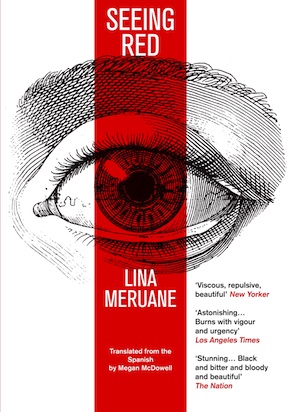Lina Meruane: Blood in the eye
by Mark ReynoldsWhen she was a PhD student at NYU, Chilean author Lina Meruane was temporarily struck blind as her eyes haemorrhaged and blood flooded her vision. Her semi-autobiographical novel Seeing Red, set in contrastingly chaotic New York and Santiago, spins off from that episode in a searing examination of illness and recovery, anger, dependency, unconditional love and identity. We meet in London.
MR: You set out to write a journal, but have said that a few pages in you “liberated [yourself] from the pains of autobiography.” Why wasn’t the journal working, and what freedoms were involved in switching to fiction?
LM: I spent many years in journalism, but I had separated myself from journalism to write fiction, so to begin with I was trying to hold myself back from writing from a personal experience. But then I was also fighting with that because I thought this is really interesting material. Usually when I’m thinking about a book I start reading everything that has been written on the subject, and I found that in stories of blindness it was almost always a sighted person telling the story of the blind person, so I thought, well, I can tell the story from the other side. What the hell, I’m going to write a memoir!
I thought of books I’d liked as memoir, like William Styron’s Darkness Visible or Sylvia Plath’s near-memoir The Bell Jar. In most memoirs the language is very flat, and I come from writing imaginative fiction where language is a very central aspect of the writing, much more important than plot. And so I thought I’d try and write the kind of memoir where I could convey the intensity of that experience. So that’s what I started doing, but maybe twenty pages in I realised that my writing was taking me into fiction, that I wasn’t so interested in what had happened, but in the questions that had come up later. Ten, maybe twelve years had elapsed and in the meantime I had read a lot and thought a lot and talked to a lot of people, so the focus of my interest had changed. I realised writing allowed me to explore not only the literal experience of going blind, but the relationships surrounding this character and questions of love and unconditionality, and also the very interesting ways that we talk visually about our life, and how visual language is. Also the way I tend to write uses a lot of free association, so one word will bring me to something else and take me further away from the real. So I allowed myself to do that. I think fiction allows one to take reality and then take it somewhere else, places that are more interesting.
So how fast was the writing process? Did you write in bursts as the short chapters might suggest?
What happened was that when I was trying to get my dissertation finished, a friend of mine who was publishing an anthology on literature and disease wanted me to write a piece. I said OK and I took two hours in the morning to write about one episode – and that gave me a framework to write one fragment per day. As I started writing in a hurry I wrote maybe the first thirty pages, but I had to interrupt because I really had to write the dissertation and I couldn’t write both at the same time, it was just too much noise, and also the language was so different. So I interrupted for the next year-and-a-half, finished the dissertation, started a new job at the university, and then I came back to the book with a grant. I was in Germany at the time and now I’m back in Germany, in Berlin. But I didn’t write it so quickly, it took me another eight months to finish the book – and it’s a short book. A lot of people tell me that it’s a page-turner and it reads really quickly, but it took me a lot of time, writing and correcting. I think there are a lot of things in the book that a reader might only capture on a second reading. Of course you can’t expect that from readers, to read your book twice, but I think there are things that are kept a little mysterious, particularly the way she speaks to Ignacio throughout the book, in parentheses. That’s for me a different timeline, but I don’t think you necessarily get that on first reading.
It’s really about how this character evolves and demands proof of love – and also that the promise of medicine will be fulfilled, so her relationships with the mother and lover and the doctor become a little vampirical.”
The fictional Lina really tests the bonds of unconditional love and dependence between a mother and daughter and between lovers. To what extent does that exaggerate what you personally went through?
Oh a great deal, of course. This is why it’s a novel and not a memoir. The real Lina was not testing the others’ love, but the fictional Lina takes the question of unconditionality to its extreme. I was really interested in that question. I am a feminist, and I’ve seen through history how women were forced to prove their love by renouncing and sacrificing – and they still do in many ways, if perhaps a little less than in other times. So I wanted to invert the question, and this became a real subject of exploration in the book. Of course there is blindness, but it’s really about how this character evolves and demands that proof of love – and she also demands that the promise of medicine will be fulfilled, so her relationships with the mother and lover and the doctor become a little vampirical.
Has your mother read the book?
No she hasn’t, but not because I didn’t offer. My mother suffers a little bit from my writing because she has a hard time separating, and she had a hard time when I went through this experience so she didn’t feel like she wanted to relive bits and pieces of that. She’s read some of my books, but mostly she doesn’t and nor does my dad, but I kind of understand that. When I was growing up my mother already had worries about my writing. I wrote poetry at the time, and she was really concerned about some of my topics. They’re both doctors, my parents, so they have always talked about really raw stuff but in a very matter-of-fact way, and yet they don’t see how that perspective on the body really nurtured my imagination.
So how long was your sightless episode?
There were two different operations and the recovery was very slow, so I was completely blind for two months, then there was a really long spell of recovery.
And how is your health now?
Thank you for asking! I’m fine, actually. I do have some visual impairment, but the thing with vision is that when the eyes receive the image and send it to the brain, it really makes up and builds in what you’re not seeing. In all the senses actually, the brain is does a lot of work filling in what is not there – or what’s not there for you. When I started I thought I had to write a book that is completely sightless, to convey the fact that the character can’t see. But what was coming out was tremendously visual, which was disconcerting until I realised that many of the things I remembered about being blind were visual, because I had either seen those things before or saw them later, or my brain completely filled out the images. So it became super-visual, actually extra-visual, in that the work was being done by the brain. That really gave me an insight into how the senses operate, and the work of imagination and memory also became themes for me to explore throughout the novel.
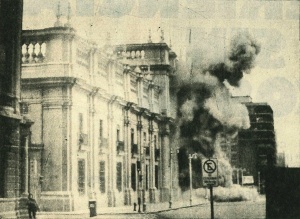
The bombing of presidential palace La Moneda during the Chilean coup of 11 September 1973. Biblioteca del Congreso Nacional de Chile/Wikimedia Commons
Two 9/11s loom in the background: the Chilean military coup of 1973 that delivered Pinochet, and New York in 2001. Which of the two has most resonance for you personally?
The Chilean. I was around three years old so I didn’t see it, but I have read so much about it and I have seen images – there’s a striking documentary by Patricio Guzman, The Battle of Chile. He was filming when the coup happened, and he was able to get film out of Chile when he went into exile to produce this six-hour documentary. There is a moment where the cameraman is filming a military man who turns around and shoots him, so he tapes his own death. It’s a super-intense documentary, and I’ve watched that and read so much throughout my life about dictatorship, so it’s very visual to me, and it had long-lasting effects on Chilean politics. Dictatorship changed the way Chileans were, changed the values of how society worked, right up to today. We’re still fighting against things that were changed during dictatorship. It really marked my growing up. Chile was all about dictatorship and the ways in which the transition to democracy was so, so long because the dictator was still there, side by side with the democratic president. So it really had an impact on the ways I think about power and hierarchy and relations between men and women. All of us in my generation share the sense that something was broken in the country and had rippled through our lives.
The New York 9/11 gave me a sense of parallel, which I think plays out in the book in a kind of double vision. Of course I was shocked. I had only just arrived in New York when 9/11 happened, but it echoed in a different way too. It really made me aware that I was a foreigner in the United States. I have a Palestinian background, so I was both a Latin American migrant also sort of half-Palestinian. I was watching TV 24 hours, and over and over again you would see Yasser Arafat expressing his shock side by side with a group of Palestinian children celebrating. Always the same five seconds – they were probably celebrating a soccer match or something – but the hypothesis that it was the Palestinians who had done it was being shown on TV alongside the towers falling.
The Palestinian community in Chile is the largest outside the Arab world, so there is a sense of belonging to that place while being completely Chilean… But when I leave Chile, my Palestinianness starts resonating more.”
I was going to come to your Palestinian background later, but let’s turn to your book Volverse Palestina [‘Becoming Palestine’ – read a sample translation at drunkenboat.com]. How would you describe your relationship with Palestine?
I was brought up as a Chilean. The early twentieth-century migrations in general, coming from Europe and the Middle East into Latin America, all assimilated really quickly. The feeling at the time was that they had to leave everything behind and become new citizens of these nations and take the opportunity to provide a better life for their children. So actually my father did not learn Arabic – he could understand some words – and my generation has already lost it. But the Palestinian community in Chile is the largest outside the Arab world, so there is a sense of belonging to that place and at the same time being completely Chilean. I grew up that way; my Palestinian background was just one part of the mix. But when I leave Chile, my Palestinianness starts resonating more. So 9/11 is a first moment, and when I ended up travelling to Tel Aviv and the Occupied Territories, my political awareness was activated. There are things you think you know, but it’s very different to see and experience what others are experiencing, and it was a nightmarish trip throughout. It was really hard to get in, and I’m not too sure I will be able to go back.
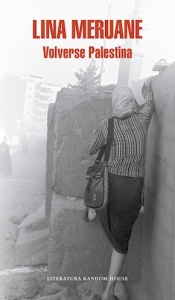 The theme of the book is actually return. The first part is a chronicle of that trip to Palestine, and it’s also a chronicle of my roots, because I realise I know nothing about that story, and I also realise when talking to my aunts and my father that the story has been lost, they have only kept the good parts and the rest has been pushed under some rug in a forgotten, ruined house that doesn’t exist anymore. It’s also a story of contemporary ruins, which is the Palestinian experience. But then in the second part, the same Lina Meruane from that travel piece travels to the library to study the history of Palestine and Israel, and to reflect on the language of the conflict, and it becomes about the words and the word-choice, how language is a battlefield and how that has developed over the last seventy years.
The theme of the book is actually return. The first part is a chronicle of that trip to Palestine, and it’s also a chronicle of my roots, because I realise I know nothing about that story, and I also realise when talking to my aunts and my father that the story has been lost, they have only kept the good parts and the rest has been pushed under some rug in a forgotten, ruined house that doesn’t exist anymore. It’s also a story of contemporary ruins, which is the Palestinian experience. But then in the second part, the same Lina Meruane from that travel piece travels to the library to study the history of Palestine and Israel, and to reflect on the language of the conflict, and it becomes about the words and the word-choice, how language is a battlefield and how that has developed over the last seventy years.
Might this be the next thing we see published in English?
Well, the first half has been translated, and this is something I’m now asking my editors to read. I think it’s a difficult book in the sense that it’s very political and some publishers might be a little nervous about it, and also it’s not written by a Palestinian, but by the granddaughter of Palestinians, and my thinking is that editors may feel that if they’re going to publish a Palestinian story, let’s hear the story of a real Palestinian. But the book did get published in Spanish, because the story of migration is shared by so many people in Latin America. I’m finishing another novel now, so I’m not going to demand that the Palestine book comes out. I would like it to, but we’ll see.
What can you tell us about the new novel?
The title translates as ‘Nervous System’, and the protagonist is a woman who has studied astrophysics. She is also the daughter of a doctor, and it’s a kind of clinical biography of this family with five characters who relate only through their diseases. It’s a very fragmentary book, much more than this one, and it’s an intricate web. The sense of system goes from astrophysics to the nervous and muscle and circulatory systems. It’s the sky, the cosmos, and also the way in which the book itself is built; things are circulating throughout.
I came to Seeing Red soon after reading Megan McDowell’s translation of Samanta Schweblin’s Fever Dream. How did you find working with her?
When Megan appeared on the horizon I was very excited and also worried at the same time because she’s the well-known translator of another Chilean writer, Alejandro Zambra, whose language is very different to mine – a bit more factual, less decorated – and I was worried that my book would sound like Zambra’s. But she really captured the tone of the book. She’s living in Chile and has a really good grip of Chilean specifics. She sent questions which I answered, then I went over her discussion with the copyeditor. Megan also found some mistakes in the book. The translator is such a sharp reader, the person who reads a book most carefully, and so she found, I don’t know, that the character stood up from the table twice on the same page, things like that, so a few corrections were also made in her translation.
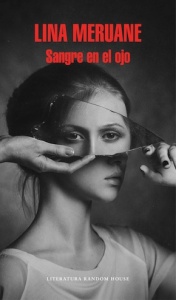 Does the Spanish title Sangre en el ojo [‘Blood in the eye’] convey they same sense of Lina’s anger?
Does the Spanish title Sangre en el ojo [‘Blood in the eye’] convey they same sense of Lina’s anger?
The Spanish has a double meaning too, it’s the literal blood and also it’s the sense of wanting revenge or being very angry with someone. I had a different title for the English version which didn’t work, but Megan assured me that this title would convey the same idea.
Did you feel much of that same anger as you lost your sight?
It’s funny, I was listening to Sarah Baume at the Edinburgh Festival, and she was saying that she had worked on a personal experience which she had fictionalised to the point where she couldn’t remember what had actually happened, she could only remember the written version. I had the same experience, where the real thing has sort of dissolved and now I only have the novel as some sort of reference. I don’t remember being angry.
Perhaps you should ask your mom…
Yeah, maybe – except my mom says I’m always angry about everything! But I don’t think I was particularly angry about going blind. It was more a time of figuring out what I was going to do next, how to deal with this new situation. It was a very difficult time, there’s no question about that, but I don’t remember being angry. Interestingly I vividly remember moments of enjoyment, laughing hard about something. I think we’re built to forget the worst parts, the suffering, and really grab the lighter parts.
So what are you up to in Berlin?
I’m spending a year with a DAAD grant for artists. I’m very happy about that because I really have little time for writing in my full-time job as a professor, and a year off and having a full day of writing is unheard-of for the last six years.
Could you say a little about the courses you teach at NYU – including the MFA in Creative Writing in Spanish?
I studied at NYU, and while I was a PhD student the director of the MFA, the Argentinian writer Sylvia Molloy, came up with the idea of founding an MFA in Creative Writing in Spanish. I was already a published writer, so she invited me to teach a course and I have basically been teaching the course since then, it’s ten years now. In the meantime I finished my PhD, I went to teach somewhere else, and then I got a job at NYU in Global Liberal Studies where I teach Latin American Cultures in English and Arts and Literatures of the World, and then I also teach an upper-level course in the representation of disease, which is something I worked on in my dissertation. Then I’m invited once a year to teach a Creative Writing workshop. It’s actually super-interesting because you get very different voices. One of the challenges for me is not to impose formulas, but to find what is particular about each text, what really conveys their imagination and how to make that work. Trying to make everybody describe characters in a certain way, produce plots in a certain way is really dangerous, and I’m always a bit wary of how Creative Writing courses can over-educate and actually stifle the creative process.
Lastly, which other Chilean or Latin American writers should we be reading, who perhaps have not yet been translated?
A lot of the people I like – Samanta Schweblin, Mariana Enriquez, Alejandro Zambra – have been translated. I’ll go back to the Chilean tradition just to mention a few. I think we owe translations to Carlos Droguett, who was a post-boom writer, a very political writer who spent a lot of time in exile in Switzerland, and among the many interesting books he wrote is Patas de perro, about a man who takes in a boy who has been born with dog legs instead of human legs. It’s a novel about bullying, about abuse, about protection, and the language is just fantastic, it’s just a really crazy, wonderful novel. That’s a book that I would love to see translated. Another writer I completely adore is Diamela Eltit, who I think has only one book translated. She’s very experimental, she would be like the Elfriede Jelinek of Chile – you know, the Austrian Nobel Prize winner – she has that tone of writing, very polemic, very powerful language. And then from my contemporaries, Nona Fernández has written a lot about dictatorship and the whole system of the intelligence service. She’s also a scriptwriter, she’s done a lot of research on that period and her fiction is very good.
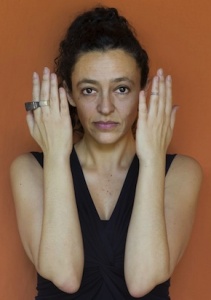 Lina Meruane is one of the most prominent and influential female voices in Chilean contemporary literature. A novelist, essayist and cultural journalist, she is the author of numerous short stories that have appeared in various anthologies and magazines in Spanish, English, German and French. She won the Anna Seghers Prize, awarded to her by the Akademie der Künste, in Berlin, Germany in 2011 for her entire body of written work, and received Mexico’s prestigious Sor Juana Inés de la Cruz Prize in 2012 for Sangre en el ojo, now published as Seeing Red by Atlantic Books in hardback and eBook, translated by Megan McDowell.
Lina Meruane is one of the most prominent and influential female voices in Chilean contemporary literature. A novelist, essayist and cultural journalist, she is the author of numerous short stories that have appeared in various anthologies and magazines in Spanish, English, German and French. She won the Anna Seghers Prize, awarded to her by the Akademie der Künste, in Berlin, Germany in 2011 for her entire body of written work, and received Mexico’s prestigious Sor Juana Inés de la Cruz Prize in 2012 for Sangre en el ojo, now published as Seeing Red by Atlantic Books in hardback and eBook, translated by Megan McDowell.
Read more
Megan McDowell has translated contemporary authors from Latin America and Spain including Alejandro Zambra, Mariana Enriquez, Gonzalo Torné, Samanta Schweblin, Diego Zuñiga and Carlos Fonseca. Her translations have been published in The New Yorker, Tin House, The Paris Review, Harper’s, McSweeney’s, Words Without Borders and Vice, among others. She is based in Santiago, Chile.
meganmcdowelltranslation.com
Mark Reynolds is a freelance editor and writer and a founding editor of Bookanista.
@bookanista

